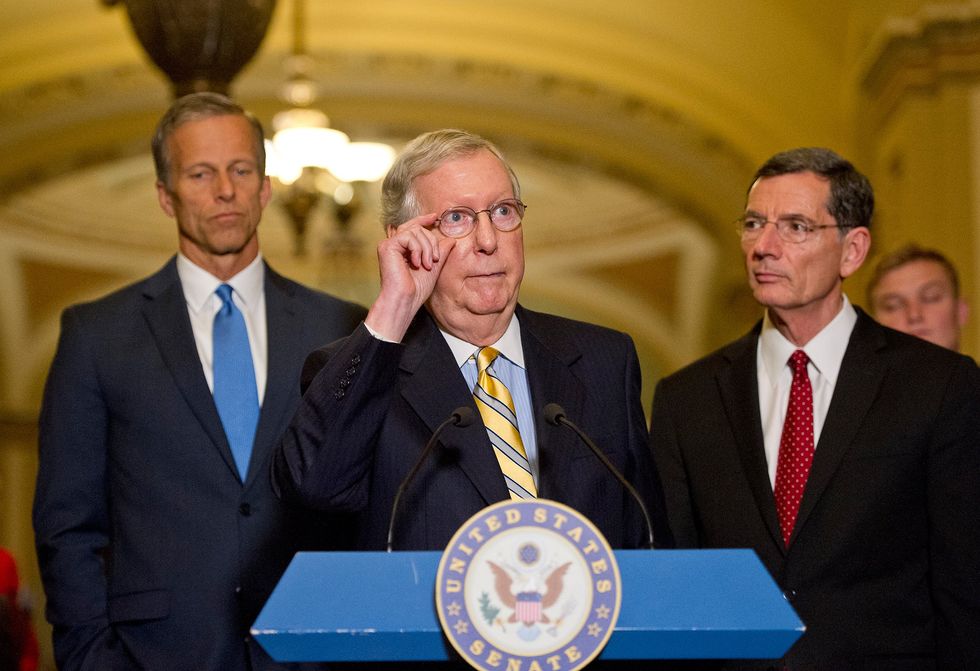A draft of the G.O.P. health care bill was released on Thursday by Majority Leader Mitch McConnell. Dropping the repeal of tax increases on high earners, the draft succeeds in using the revenue to fund A.C.A.'s (the Affordable Care Act) more progressive features which include expanding Medicaid and increasing subsidies for poorer families, allowing them to purchase private insurance. Although this is somewhat of an improvement from the last version of the bill, it is not enough.
In fact, if it were to pass, the law would only spell disaster for the country's healthcare system. As deductibles go up, millions of Americans would lose their healthcare coverage.
During the 1960s, the Johnson administration created Medicare (for seniors) and Medicaid (for impoverished families). But many who did not fit in to either of those categories were left to fend for themselves. By 2013, around 20% of adult Americans were left without any coverage. The A.C.A. was determined to fix this:
1. The A.C.A. went on to raise the income threshold for eligibility, thus allowing citizens with incomes right below the poverty line to qualify. The change was immediate. By 2014, it had enabled close to 14 million Americans to obtain health care.
2. To make private insurance more accessible and affordable, the A.C.A. decided to offer federal subsidies to low-income households that issued a series of directives. By forcing people to purchase coverage, it improved the overall quality of risk pools. The A.C.A. additionally required insurance companies to offer standardized policies with benefits, banned such companies from turning away customers with preexisting conditions, and placed rigid limits on how much more they could charge older citizens.
The new draft of the Senate bill would eventually destroy such efforts by reversing both the progress of Medicaid and the reforms that were designed to create a fairer system of private insurance. In other words, it would inherently return the country back to where it started, when older citizens, sicker citizens, and poorer citizens struggled everyday to find coverage.
The bill still contains a cut of 700 billion dollars to the Medicaid program and the idea of converting it to a "block-grant program". According to the Congressional Budget Office, 15 million fewer people would be covered by Medicaid by 2025. Despite objections from even some Republican senators, the bill refuses to change. Supported by Senators Ted Cruz and Mike Lee, the bill also includes a new amendment allowing for the sell of unregulated, catastrophic-care plans outside government-run exchanges (given that an insurer would offer a standardized, A.C.A. compliant policy).
At first glance, this proposal seems rather innocent. But in reality, it's a direct attack on the insurance market and thus a direct attack on Obamacare. For younger people, the premiums on the unregulated plans would be fairly low and come with large deductibles. However, insurers would be allowed to charge older, less-healthy customers higher prices or even deny them coverage. As these customers continue to purchase comprehensive plans while younger customers choose the cheaper options outside the market, the risk pools (in the Obamacare markets) would become progressively worst. As insurers hike up prices, people with serious illnesses won't be able to afford them. A cycle of rising prices and falling enrollments could eventually lead to a market collapse.
It is not a question of whether or not this is the G.O.P.'s intention; rather, it is a question of how private health care works in an unregulated market. Before the A.C.A., the U.S. lived for years with a system that discriminated against the sick, the old, and the poor. Sooner or later, we could be looking at the same system. But unlike the G.O.P., I don't want to wait around to find out.


















